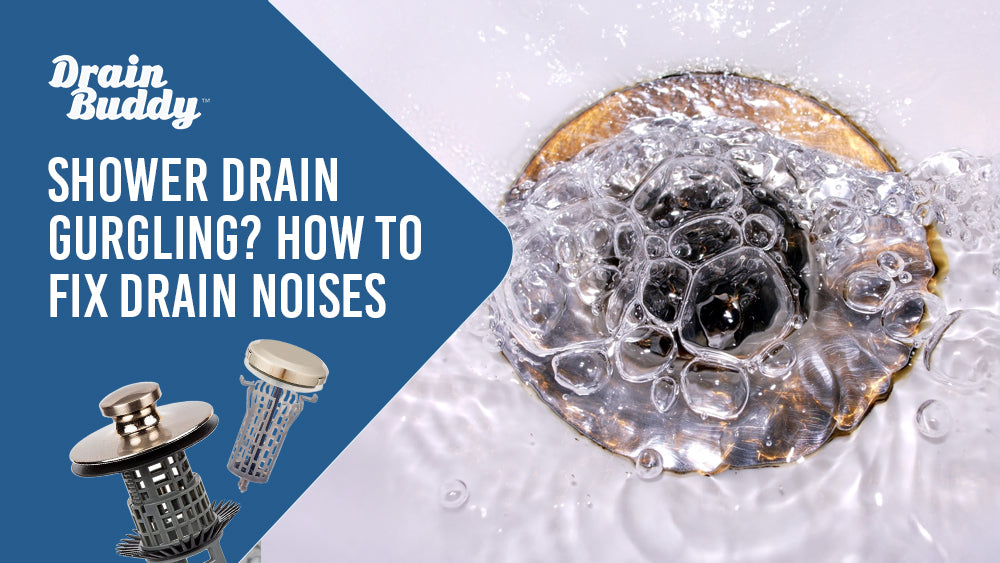Summary:
- Gurgling sounds from a shower drain often indicate venting or clogging issues.
- DIY methods like plunging or using a drain cleaner can resolve many cases.
- Persistent noises or foul odors should be investigated by a plumber.
- Preventative tools like Drain Buddy help reduce future plumbing problems.
- Regular cleaning and drain maintenance lower the risk of costly repairs.
Shower drain noises can be more than just an annoyance. They may signal underlying issues in your plumbing system. Gurgling, hissing, banging, and squealing sounds often result from blocked vents, clogged pipes, or water pressure problems. Left untreated, these problems can escalate into costly repairs and major household disruptions.
Fortunately, many of these issues can be resolved with simple do-it-yourself fixes. With the right tools and knowledge, homeowners can restore normal drainage and eliminate strange sounds. Additionally, using reliable drain protection products like Drain Buddy offers a proactive solution for maintaining quieter and healthier plumbing systems.
Common Causes of Shower Drain Noises
Different sounds coming from your drain point to different problems. Identifying the type of noise is the first step toward a solution.
1. Gurgling
This is the most common sound and usually indicates a partial blockage in the drain or a blocked plumbing vent. Air gets trapped and pushes through water in the pipes, creating a gurgling noise.
2. Hissing or Whistling
High water pressure or a worn-out valve can cause a whistling or hissing sound during water flow. If this continues over time, it may damage your pipes or fittings.
3. Banging (Water Hammer)
When water suddenly stops or changes direction, it can create a loud banging noise. This typically happens when air chambers in the plumbing system are drained or pipes are loose.
4. Squealing
This sound generally comes from a failing shower valve or diverter. It can signal wear and tear that might require part replacement.
DIY Fixes for Noisy Drains
Before calling a plumber, several straightforward solutions can be attempted to reduce or eliminate shower drain noises.
1. Clear Clogs
Blockages are one of the leading causes of gurgling and slow drainage. These can often be cleared using:
- A plunger for minor obstructions near the surface
- A manual drain snake to reach deeper blockages
- A natural solution using baking soda followed by vinegar, finished with hot water
Avoid chemical cleaners that can corrode plumbing over time. The Environmental Protection Agency has also highlighted risks related to improper chemical disposal.
2. Check Vent Pipes
If plunging or snaking doesn't help, the issue may lie with the plumbing vents. These pipes release sewer gases and allow water to flow smoothly.
Clear vent pipes by:
- Inspecting the rooftop for visible obstructions like leaves or nests
- Flushing the vent with a garden hose, if accessible
If the vent is hard to reach or clogged internally, a plumber may be required.
3. Inspect Drain Components
Sometimes, the source of noise is the drain hardware itself. A dirty or poorly fitting drain cover can affect water flow.
Replacing a traditional strainer with a more advanced solution like the Drain Buddy Ultra Flo can help. This product:
- Requires no installation and fits over 90 percent of standard drains
- Captures hair and debris out of view, reducing clogs
- Includes six recyclable replacement baskets
- Is made from mold-resistant material for long-term hygiene
- Works in utility sinks as well as standard tubs
This type of drain catcher helps prevent buildup that leads to noise and slow drainage.
4. Adjust Water Pressure
If hissing sounds are coming from your shower, check the home’s water pressure. A pressure that exceeds 60 psi can lead to long-term damage.
Steps to adjust water pressure include:
- Testing with a pressure gauge
- Installing a pressure-reducing valve if necessary
- Contacting a plumber for persistent or unclear issues
Prevent Future Drain Noises
The best approach is prevention. A few consistent habits and reliable tools can reduce the risk of noisy drains and costly plumbing bills.
Recommendations include:
- Installing a drain guard such as Drain Buddy Ultra Flo to catch hair and debris
- Cleaning drains monthly using a baking soda and vinegar mixture
- Avoiding chemical drain cleaners that can weaken pipes
- Scheduling an annual plumbing inspection, particularly in older homes
- Using drain covers when bathing pets to prevent hair from clogging pipes
Conclusion
Shower drain noises are often symptoms of problems lurking below the surface. Whether caused by blockages, venting issues, or worn-out plumbing components, these sounds should not be ignored. Fortunately, many of these issues can be fixed with simple solutions like plunging, vent inspection, or using an effective drain protector.
For homeowners looking to prevent clogs and maintain quiet, smooth-draining showers, Drain Buddy Ultra Flo is a reliable solution. It offers a user-friendly, chemical-free, and maintenance-efficient way to protect your home’s plumbing.







